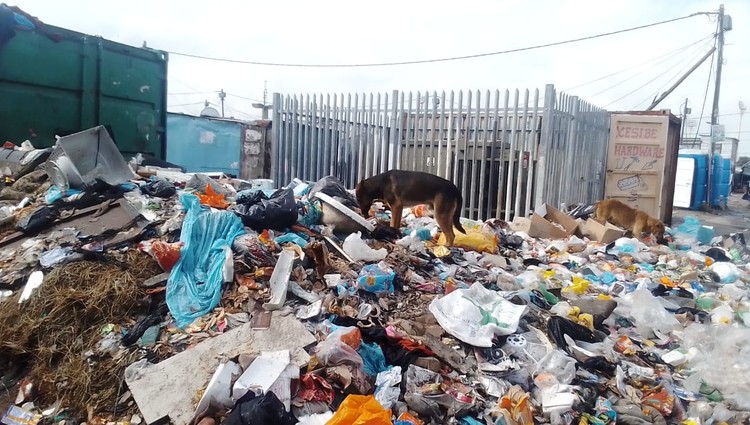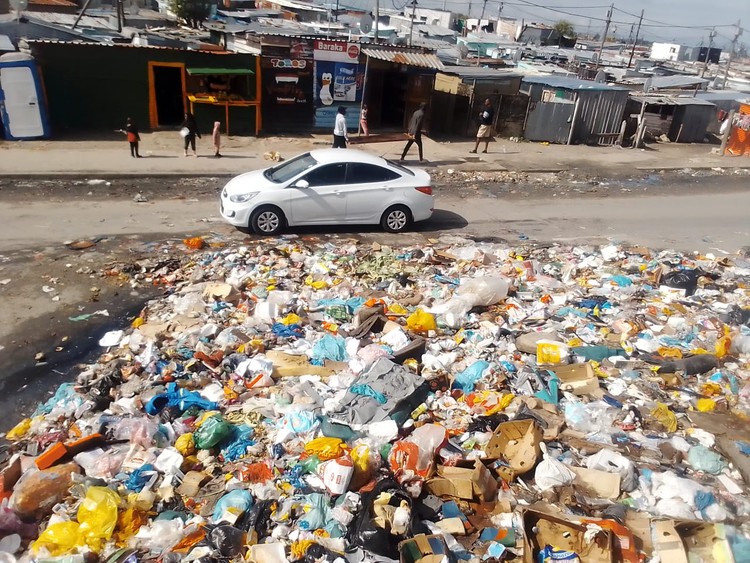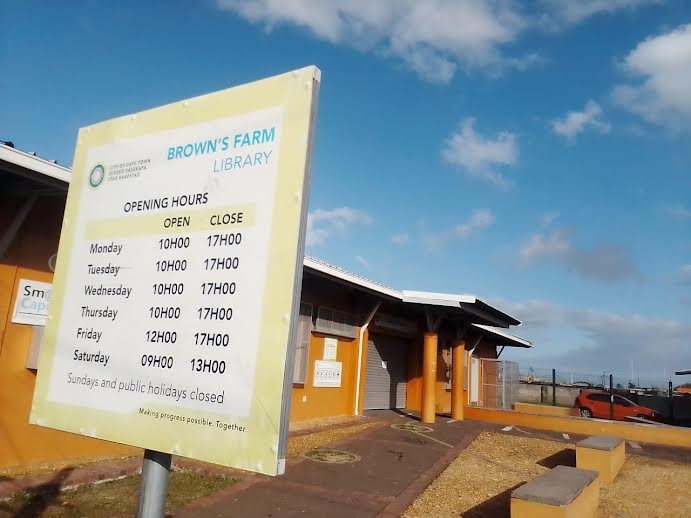Freedom Day in Philippi: gunshots, robberies and piles of rubbish
Crime has free rein in one of Cape Town’s poorest suburbs
Rubbish is piling up in Samora Machel in Cape Town, because employees of the cleaning company contracted to the City of Cape Town are afraid to enter the area. Photos: Sandiso Phaliso
Freedom Day dawns in Philippi, Cape Town, with daily gunshots, murders, robberies, car-jackings and the intimidation of City of Cape Town contract workers. Crime has free rein here in one of Cape Town’s poorest suburbs: dustbin collectors have withdrawn services in Philippi East after a worker was shot dead on Tuesday while collecting bins and the library in Brown’s Farm has been closed after staff were robbed of their cellphones.
In nearby Samora Machel, rubbish has not been collected for weeks because employees of the cleaning company, Wastemart, contracted to the City of Cape Town, are afraid of entering the township. Two weeks ago Wastemart employees were intimidated and threatened, apparently by a syndicate extorting protection money from government contractors.
GroundUp sent questions to Wastemart and called the number on the website but we have not had an answer.
After the Wastemart workers were threatened, a meeting was held between the ward councillor, community leaders, SAPS and Law Enforcement, and arrangements were made for the contractors’ vehicles to be escorted by law enforcement officers on refuse collection day, the City of Cape Town’s Mayco Member for Urban Waste Management Grant Twigg told GroundUp.
“However due to limited policing resources it will not be possible to sustain this in perpetuity,” said Twigg.
Then this week thugs struck again at employees of a cleaning company; one worker was shot dead in Philippi East and the killers fled the scene according to witnesses. Police spokesperson FC van Wyk said the murdered man was 48 years old. “According to reports the victim and his colleagues entered the area to empty dustbins; while they worked at the front of the truck and he at the back, they heard two shots being fired, upon inspection they found the deceased lying on the ground with a gunshot wound to his head.” No-one has been arrested and the investigation is in progress, Van Wyk said.
After the shooting, rubbish bin collection and other city services in Philippi East, Brown’s Farm and Samora Machel were immediately halted and workers congregated in a safe area at the Philippi East police station.
Employees of other companies have also stopped collecting waste because they have been told to stop work until their bosses pay extortion money.
Even the City of Cape Town’s stormwater drain staff have halted their service.
Rubbish is blocking the drains and Oliver Tambo Drive in Samora Machel is full of garbage. Plastic items, cardboard, rotten food, nappies, shoes, and bits of old electric appliances litter the streets.
“We are forced to burn rubbish,” said resident Nkosiyamntu Gcotyiwe. With regard to the extortion fee, Gcotyiwe said most, if not all, businesses in and around Samora Machel were paying the extortion fee. If they did not, he said, they were intimidated.
“Many people have resorted to moving to other areas because they no longer felt safe around here. We don’t blame the workers because they are scared for their lives, but the City needs to up its game and deliver services. We can’t continue living in this filth, we have had enough,” said Gcotyiwe.
Ward councillor Lungisa Somdaka confirmed that City workers and contractors had stopped operating because of the threats from the criminals. Questions sent to the City of Cape Town had not been answered by the time of publication.
The streets of Samora Machel are full of garbage.
Philippi, with a population of more than 190,000 people in 2011, is one of Cape Town’s poorest areas, with a 38% unemployment rate according to that year’s census. Fewer than half the households lived in formal housing and 78% earned R3,200 or less a month. One third did not have direct access to piped water and 23% did not have access to a flush toilet.
The Western Cape government’s most recent crime report notes that 183 murders were recorded at Philippi East police station, among the highest in the province.
Crime has also struck the Brown’s Farm library, which has been closed for nearly a month after criminals with guns and knives robbed four staff members of their cellphones on 29 March. About 20 patrons were in the library at the time, but they were not robbed, according to City of Cape Town Mayco Member for Community Services and Health Patricia Van der Ross.
Jobseekers, learners and students now have no computer access to complete their applications or assignments. The nearest library is in Crossroads, two kilometres away.
The gunmen posed as library-users to gain entry into the library. This is not the first time the library has been closed by criminals: it was robbed last year in August.
The library at Brown’s Farm has been closed since gunmen robbed staff of their cellphones.
Some of the people committing robberies in the area are teenagers as young as 13. They are often known to the community, but people are scared to work with SAPS because they might be killed.
Residents are even scared to speak out publicly about crime.
In Philippi you leave your house at your own risk. Motorists are a target, especially visitors. Gunshots are an everyday occurrence.
Weekends, from Friday to Monday morning, are especially scary, as alcohol is a major contributor to crime. Shebeens stay open until early hours of the morning and often sell to under-age children.
“There is unemployment, a high number of school dropouts, drugs and gangsterism and few recreational facilities, let alone role models, for children. This is not a place to raise your children,” said a resident. “Another problem is inadequate street lighting and informal settlements that the police cannot access because there are no roads.”
Residents have started neighbourhood watches and members stand at crime hotspots, but armed only with sticks there is little they can do against criminals with guns. As a result some people take the law into their own hands by assaulting or even killing people suspected of wrongdoing.
Life is tough in Philippi and you have to try to avoid trouble.
Next: Panashe, four months old, lives in a ditch with his mother
Previous: Hundreds of COGTA workers protest in Pretoria over unpaid wages
© 2023 GroundUp. This article is licensed under a Creative Commons Attribution-NoDerivatives 4.0 International License.
You may republish this article, so long as you credit the authors and GroundUp, and do not change the text. Please include a link back to the original article.
We put an invisible pixel in the article so that we can count traffic to republishers. All analytics tools are solely on our servers. We do not give our logs to any third party. Logs are deleted after two weeks. We do not use any IP address identifying information except to count regional traffic. We are solely interested in counting hits, not tracking users. If you republish, please do not delete the invisible pixel.





